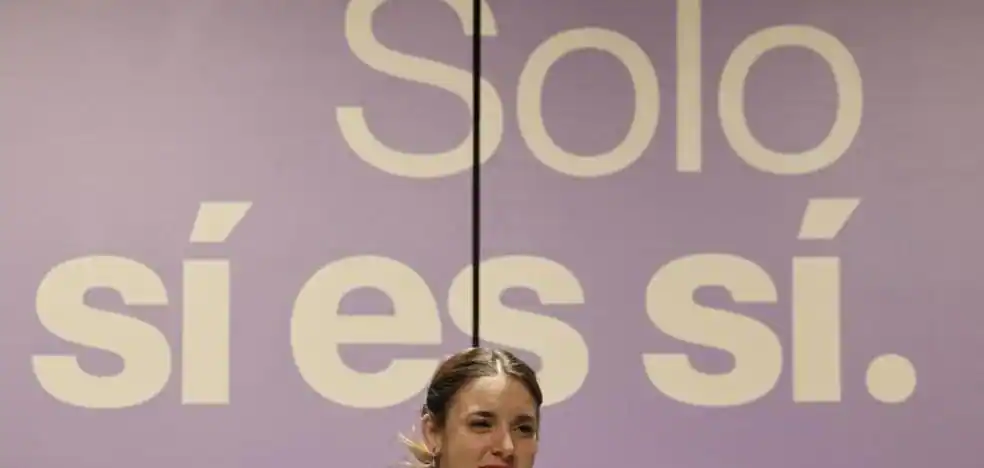The Minister of Equality, Irene Montero /
In an act of reaffirmation, he insists that he agrees to reform the law by raising the sentences, but without “swallowing” consent and censuring the socialists for “not knowing how to plug the hole” they denounce
The struggle between the PSOE and Unidas Podemos in the Government before the reform of the law of ‘only yes is yes’ ordered by President Sánchez continues when the time horizon approaches – this Monday or, at most, Tuesday – that The Socialists have given to push forward alone with a bill in Congress, after an extension of the initial term that expired this past Friday. The Minister for Equality, Irene Montero, has had an impact today, as she has been doing in recent days, that she agrees to change the rule even though neither she nor her party believe it is necessary and to make adjustments such as increased sentences, but as long as that misses the core of consent. Equality continues without giving the go-ahead -nor vice versa- to the Justice proposals in the hands of the PSOE and Montero has implicitly pointed to Pilar Llop’s ministry when questioning the data that is becoming known about the reductions in sentences for sexual offenders; 400 already, with thirty releases.
He has done so in an act of reaffirmation of the benefits of the law despite the “hole” that, according to Montero, “nobody” knows how to explain or “how to cover it”, and of internal pedagogy convened by Podemos in the Círculo de Bellas Artes in Madrid , under the eloquent slogan of “Did you consent or not? and in full conflict with the senior partner of the Executive. In front of 300 militants, who have received him with shouts in favor of ‘only yes is yes’ on the platform that he has shared with the party leader, Ione Belarra, and other charges such as the judge and government delegate against Gender Violence, Victoria Rosell, the head of Equality has described as “unheard of that we still do not have the data on how many sentences have been reviewed and how many have not »and how many are firm or not, an accusation of lack of transparency addressed to Justice even though it has chosen not to mention it with all the letters. Since the approval of the law, this newspaper has carried out successive accounts thanks to the figures provided by the 17 superior courts of Justice. The thesis that underlies Podemos’s reproach is that there are more court decisions that leave sentences as they are than those that lower them; this after having attributed a generalized “machismo” to the judiciary.
Both Montero and Belarra have avoided charging the inks, for its acronym, in the PSOE with which they continue to negotiate. But they have come to criticize their partners by way of stating that if the Socialists carry out the reform only with their signature, they will have to approve it in Congress at the hands of the PP of Alberto Núñez Feijóo, whom the purples They have been accused of leading the “offensive” against the Equality standard. “Who’s in charge here?” Montero asked himself again, in a speech almost copied from the one delivered this Saturday at another event, this one in Murcia. According to the purples, the proposal of the ministry of Pilar Llop – which transferred a new text to Equality on Friday after the half dozen responses, without approach, sent in turn by Montero since December -, intends to return to the previous model in which the Consent was buried, in the eyes of United We Can, by the requirement of violence to convict and the demand that the victim clarify whether or not they had resisted. And that regression is, in the eyes of Podemos, almost the same thing that the right aspires to do.
Montero has delved into the story that he saw championing before his own and public opinion, reiterating that he has opened up to modulating the law and assuming “conditions” of the PSOE such as the elevation of penalties in favor of a “unitary” position in the Government that avoid a bankruptcy that would be very severe. But he is not going to “swallow”, he has returned to warn the president and the socialist wing of the Executive, with which he returns from the “Did you consent?” to “Did you resist”? in a norm that he, he emphasized he, is “of the women”. Since the crisis broke out, the minister and her party have been trying to make partners in a law that they continue to consider the former Minister of Justice and today a magistrate of the TC, the socialist Juan Carlos Campo, and his “spectacular” team of jurists “well done”. despite the discrepancies that already surfaced during the drafting of the regulations, not only with him, but also with the then vice president Carmen Calvo. And although the then leader of Podemos and at the time number three in the Executive, Pablo Iglesias, came to refer to Campo himself as a “frustrated macho” due to the observations and possible deficiencies that he had warned about the literalness of the ‘only yes is yes’. Montero has deduced from the tug of war on the law and the criticism received that there is “an offensive against the coalition government”, and has positioned the legislative initiative as “the most important” output of the Council of Ministers in terms of feminist progress this legislature , a paradigm no longer of women’s rights, but of “the democratization” of the country.
While other voices in the act combined the vindication of the protection of women with a defense of comprehensive plans because only “punitiveness is not the solution” – “We are freer with a comprehensive law than with a criminal law,” Rosell assured- , Belarra has joined Montero’s charge against the PP. The popular ones have offered Sánchez his support in Congress for the reform to stop, always in the future because the aggressors already sentenced will be able to continue taking advantage of the most favorable norm for their interests, the current one. For the leader of Podemos, Feijóo’s party lacks “democratic DNA” and still today does not accept that it lost the last generals. “It is becoming clear that all this issue of lowering sentences is an excuse used by the PP to return to the model of violence and intimidation,” said Belarra, for whom the popular “does not care” that in Spain only “8% of attacks on women are reported.”
#Montero #points #Justice #questioning #data #reductions #sentences








/s3/static.nrc.nl/bvhw/files/2023/02/data96339016-2b6772.jpg)

